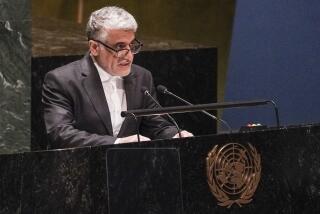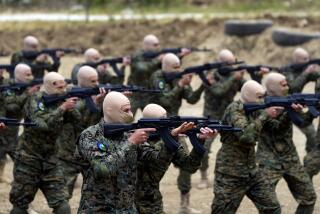Arab League Stands United Against the Threat of a U.S. Attack on Iraq
CAIRO — After months of expressing their individual opposition to a U.S. attack on Iraq, Arab leaders offered a united front Thursday, declaring their “total rejection of the threat of aggression on Arab nations, especially Iraq.”
The statement was issued at the end of a two-day meeting of the Arab League, the 22-member interest group that has often found it extraordinarily difficult to join forces behind a single agenda.
But propelled by anger over the Israeli-Palestinian conflict, Arab leaders have forcefully notified the White House of the region’s profound opposition to an attack. The only nod to U.S. demands was a renewed call on Iraq to allow the return of United Nations weapons inspectors to the country.
“If this war takes place, we see it against a backdrop of terror and anger in the Middle East,” said Amr Moussa, the league’s secretary-general. “People are angry and frustrated and cannot accept what is happening in the occupied territories.
“We will continue to work to avoid a military confrontation or a military action,” he said, “because we believe that it will open the gates of hell in the Middle East.”
Although U.S. allies such as Kuwait and Jordan have said they wouldn’t object to a regime change in Baghdad, the social climate in the Arab world is so agitated, no leader is willing to express anything but total outrage at American intentions toward Iraqi President Saddam Hussein.
That has created an environment in which Washington says Hussein must be eliminated because he is a threat to his neighbors, even as all of those neighbors have joined together, at least publicly, to declare their opposition.
“If the United States invades Iraq, it will cause deep anti-American feeling and will provoke revenge and violence in Arab and Islamic countries,” Youssef ibn Alawi, Oman’s minister of state for foreign affairs, said this week at a meeting of the six-nation Gulf Cooperation Council in Jidda, Saudi Arabia.
“The world cannot accept a weakened role for the United Nations,” said Alawi, whose country plays host to a U.S. air base and arms depot. “Those who are thinking they can impose a new law for their own benefit, they are pushing the world into instability and chaos.”
It is difficult to determine whether this tough talk means that the United States will be barred from using key military installations throughout the region.
The tiny emirate of Qatar, for example, with two important bases and a high-tech command center, has dodged the question, saying it has not yet received a formal request from the United States. But there is tremendous Arab peer pressure mounting on the countries that are strategically important to the United States, and so far they have stuck with the party line.
“We cannot imagine that any government will be part of any military action against any Arab state,” Moussa said Thursday at the end of the Arab League meeting. “We all feel the danger.”
Bahrain, which plays host to the U.S. Navy’s 5th Fleet, expressed a similar sentiment.
“We, the Arabs, must voice a clear stance against any new war in the region,” Bahrain’s prime minister, Sheik Khalifa ibn Salman Khalifa, said this week. “A new war will certainly be disastrous economically, politically and socially not only for our brothers in Iraq, but for the whole region and all the Arab states as well.”
The meeting of Arab League foreign ministers was a regularly scheduled gathering. League officials pointed to the 100% turnout as proof of the deep conviction that the region must unite behind Iraq. Regularly scheduled meetings generally attract about half as many participants.
Iraqi Foreign Minister Naji Sabri, who flew in from Russia to attend the meeting, was the star attraction and used the opportunity to repeat his message of solidarity with the Arab community and condemnation of the United States.
“The Arab states have demonstrated their rejection to any threat against Iraq,” he said in brief comments to reporters. “This decision shows Arab awareness of the sick minds of the U.S. administration.”
During the talks, Arab leaders also called for an end to U.N. sanctions against Iraq and tried to persuade Sabri to take their case for readmitting weapons inspectors back to Baghdad.
The United Nations imposed strict sanctions against Iraq after it invaded Kuwait in 1990. The sanctions are to be lifted only when inspectors determine that Iraq has eliminated all of its weapons of mass destruction and its ability to create such weapons. Inspectors were pulled out before a U.S.-led strike against Iraq in 1998 and have not been allowed back in.
The Arab leaders also used the opportunity Thursday to restate their case for viewing the Iraq conflict in the context of the fight between Israelis and Palestinians. Still, the Palestinian issue did, at least for this meeting, take a back seat to the urgency expressed over a possible invasion of Iraq.
“An attack on Iraq,” said Nabil Shaath, the Palestinian minister of planning and international cooperation, “is an attack on the whole Arab world.”
More to Read
Sign up for Essential California
The most important California stories and recommendations in your inbox every morning.
You may occasionally receive promotional content from the Los Angeles Times.










